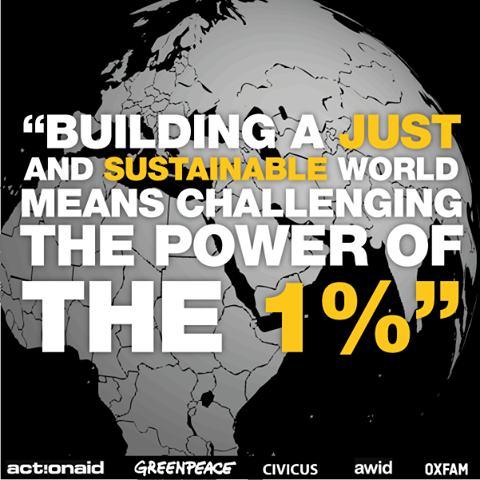
A joint call from the leaders of ActionAid, AWID, Civicus, Greenpeace and Oxfam on the eve of the World Social Forum in Tunis
The widening gap and imbalance of power between the richest and the rest is warping the rules and policies that affect all of us in society, creating a vicious circle of ever growing and harmful undue influence. Global efforts to end poverty and marginalisation, advance women’s rights, defend the environment, protect human rights, and promote fair and dignified employment are all being undermined as a consequence of the concentration of wealth and power in the hands of a few. Decisions are being shaped in the narrow interests of the richest, at the expense of the people as a whole. The economic, ecological and human rights crises we face are intertwined and reinforcing. The influence of the 1% has increased, is increasing, and ought to be diminished.
Faced with this challenge, we need to go beyond tinkering, and address the structural causes of inequality: we cannot rely on technological fixes – there is no app for this; we cannot rely on the market – unchecked it will worsen inequality and climate change; and we cannot rely on the global elites – left alone they will continue to reinforce the structures and approaches that have led to where we are. As the Rustlers Valley letter to civil society leaders noted, civil society organisations need to be bold in building from below. We need to help strengthen the power of the people to challenge the people with power.
People’s mobilisation and active citizenship are crucial to change the power inequalities that are leading to worsening rights violations and inequality. However, in all regions of the world, the more people mobilise to defend their rights, the more the civic and political space is being curtailed by repressive action defending the privileged. We therefore pledge to work together locally, nationally and internationally, alongside others, to uphold and defend universal human rights and protect civil society space. A more equal society that values everyone depends on citizens holding the powerful to account.
We will work together with others to tackle the root causes of inequality. We will press governments to tackle tax dodging, ensure progressive taxes, provide universal free public health and education services, support workers’ bargaining power, and narrow the gap between rich and poor. We will together champion international cooperation to avoid a race to the bottom.
We will work together for a human rights and feminist agenda that curbs the influence of the corporate sector in defining national development agendas. We will champion living wages, the redistribution of women’s unequal share of unpaid care work, and the tackling of violence against women brought on by state repression and rising fundamentalism.
We will work together with others to secure climate justice. We will take on the power of the fossil fuel companies who are undermining efforts which respond to science and protect people and planet. We will press for action that properly holds accountable those most responsible for climate change, and addresses the losses and secures the rights of those who are suffering the most from its impacts.
As early steps in this long walk, we will work together at the World Social Forum in Tunis to galvanise attention on the closing of civil society space and how it threatens efforts for a more equal society; we will show solidarity for those threatened for speaking out; we will develop shared actions on our common priorities; and we will encourage the coming together nationally and internationally of our organisations and allies who share the agenda set out here.
A more inclusive society, at the service of human beings, is both essential and achievable. But only if we work together to insist on it. Another world is possible. We will work together to help make it happen. We will work together to stop the growing concentration of wealth and power in the hands of a few and to achieve redistributive policies to reverse inequality, and we will take on regressive corporate and elite interests who stand in the way. Ensuring a more just and sustainable economy and society is not principally a technical challenge but rather one of political will. It is to generate the pressure necessary for change that civil society organizations are coming together and the movement for social justice is building.
Adriano Campolina, ActionAid
Lydia Alpízar Durán, Association for Women’s Rights in Development (AWID)
Dhananjayan Sriskandarajah, Civicus
Kumi Naidoo, Greenpeace
Winnie Byanyima, Oxfam
2224x1253.jpg)